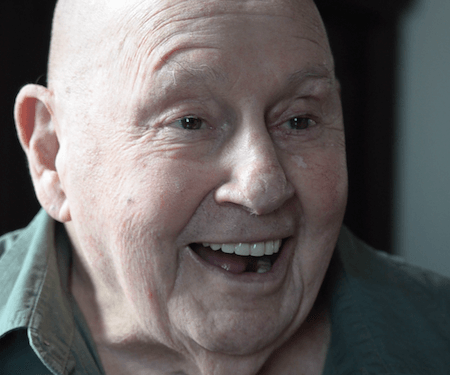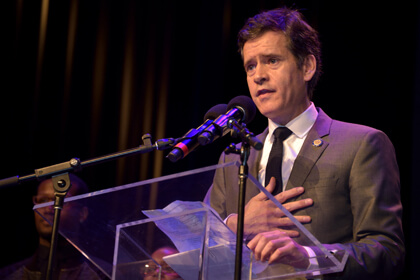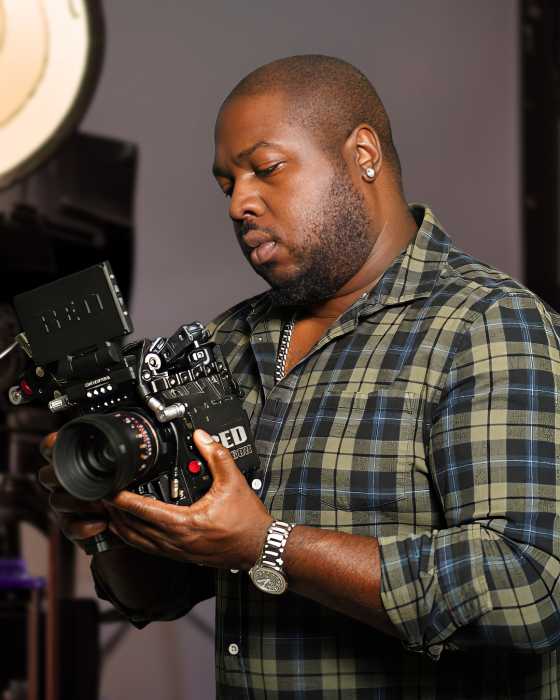Ron Gold, 1930-2017. | ROSENFELS.ORG
Ron Gold, who told a committee of shrinks, “Stop it, you’re making me sick!,” in a 1973 speech as part of the successful campaign to get the American Psychiatric Association (APA) to remove homosexuality from their Index of Mental Disorders, died at his East Village home May 1 at the age of 87.
Gold died in the arms of his husband, Ali Akbar, his partner of 17 years. Lesbian activist Chris Marchitello, his friend of more than 40 years, said the cause was heart failure.
Gold was a veteran of the Gay Liberation Front and the Gay Activists Alliance, a co-founder of what began as the National Gay Task Force in 1973, and an early leader in the fight for positive gay images in popular media.
Dr. Charles Silverstein, founder in 1973 of the Institute for Human Identity, said Gold was chair of the group that agitated for the change at the APA. While it grew out of the Gay Activists Alliance (GAA), it was called The Ad Hoc Committee because GAA itself had a policy of “not cooperating or negotiating with the oppressor.”
Co-founder, in 1973, of Task Force led early protests of negative media images
In 1972, Gold worked on a GAA zap led by Bill Bahlman at the APA convention at the New York Hilton. During a panel discussing homosexuality, Bahlman wrote, “we began to pop up challenging the panelists. ‘How dare you say I am sick?’ We shouted about the harm they cause gay people. From forcing people to suppress their sexuality, performing shock therapy and lobotomies. They were shocked and seemed totally surprised to come face to face with Gay people who were proud and happy with who they were and demanding that the APA change its ways.”
At the APA’s nomenclature committee on February 8, 1973, Silverstein recalled, “I gave the professional presentation, Jean O’Leary gave the civil rights presentation,” and Gold got Dr. Robert Spitzer, a member of the committee, to let him give his famous “Stop It!” speech at the APA’s Honolulu convention later that year.
“Ron was filled with bombast and attacked them as murderers,” Silverstein said. “My approach was to use humor and take various diagnostic categories that had been used in earlier manuals and show how they were socially motivated and had nothing to do with psychiatric illnesses,” citing “‘vagabondage,’ ‘pathological mendacity,’ and ‘masturbation’” as things once classified as signs of mental illness.
The committee voted to eliminate “ego syntonic homosexuality” (self-accepting) as a mental illness, leaving only “ego dystonic homosexuality” (self-loathing) in the manual.
Gold told the APA in Honolulu on May 29, 1973, “Your profession of psychiatry — dedicated to making sick people well — is the cornerstone of oppression that makes people sick” (the full text is here).
The APA’s executive board ratified the committee decision, which later survived a challenge before the full APA membership brought by the anti-gay Dr. Charles Socarides who, Gold noted, diagnosed gay people as having “wild self-damaging tendencies” and “onslaughts of paranoid ideation” — descriptions, Gold said, that were “based entirely on studies of patients in treatment that… don’t apply to most of your homosexual patients, and do apply to many of the heterosexuals.”
Sue Hyde, a lesbian activist since 1973 and director, since 1986, of the Creating Change conference at what is now the National LGBTQ Task Force and, said, “Ron Gold was a visionary leader of our movement and his role in the de-pathologizing of homosexuality was key and pivotal to that victory. In my mind, that particular victory stands as the most important one for our movement because the lifting of the label of mental illness as it relates to homosexuality opened the door to many other victories. It aligned the American Psychiatric Association and the American Psychological Association and other professional organizations with the notion that LGBTQ people could be and are mentally healthy.”
Hyde added, “He started as a reporter at Variety and knew the ways of Hollywood,” leading to his 1974 interaction with producers of Robert Young’s “Marcus Welby, MD” on ABC about an episode called “Outrage” about a male teacher raping a boy, which conflated being gay with pedophilia. “His advocacy to get attention to the homophobia of that episode set a fire around the country for our movement to pay more attention to media representations of us.”
In ‘74, Gold was also successful in getting NBC to edit an episode of “Police Woman” with Angie Dickinson that included a negative depiction of lesbians.
“It’s our view that because we showed a little muscle with ABC, NBC took it off the air,” he told United Press International. “When gay people are on TV, they are always pictured as murderers or freaks or figures of fun. We don’t object to humorous portrayals, but not when they are offensive.”
Gold went on to write the first media guide for the Gay and Lesbian Alliance Against Defamation in 1986.
Bahlman described Gold as a “fierce media spokesperson” for GAA.
“I remember being arrested with him along with Nath Rockhill,” Bahlman wrote. “Nath & I were blocking traffic attempting to enter the Brooklyn Bridge, Ron was on the sidewalk wearing a card that said media. The police swooped in on him to arrest him so as to rob GAA of our voice to the media. Ron wound up in the cell next to mine. He shouted relentlessly that he had been falsely arrested, that he was our media representative and demanded to be released. He was not silent the entire time we were in the cell block, at least three hours or so.”
Rich Wandel, an early GAA leader and later head of the LGBT Community Center archive that houses Gold’s papers, wrote, “I think of Ron primarily in terms of media relations. He was one of the people who would write statements or short quotes which were then attributed to me as GAA president. His most important work was as a co-founder of GLAAD, in which he demonstrated both a willingness to work and also his media savvy.”
For the archive, Gold wrote of himself that he was born in Brooklyn on April 22, 1930, “entered Brooklyn College at 15, and took 12 years to get a degree. By that time he had been a junkie and had his head shrunk in Topeka, Kansas,” entered journalism, and “became a full-time gay liberationist at the age of 41.” After citing his work at the Task Force and challenging the APA, he wrote, “In the early 1980s he quit activism to ‘learn how not to have to be effective,’ which he learned so well that he hasn’t had a full-time job since. He’s had four live-in lovers since 1959 (he prefers to call them ‘mates’): a Cuban, two Puerto Ricans, and a Bangladeshi. It was while he was living in Bangladesh that he wrote his as-yet-unpublished book, ‘Polarity: The Psychology of Paul Rosenfels.’” (The book can be found at rosenfels.org/rgPolarity.pdf.)
Veteran gay activist Steve Ashkinazy wrote, “Ron’s biggest contribution was authoring the booklet ‘20 Questions about Homosexuality,’ in 1970, which he expanded to ‘25 Question’s About Homosexuality’ in 1972. For a long time that booklet was the only available information in print that spoke openly and positively about gay identity” –– along with Dr. George Weinberg’s “Society and the Healthy Homosexual.”
“It was very instrumental in spreading GAA’s message of Gay Liberation, enabling people to come out, winning the support of new advocates, and leading to the creation of LGBT organizations across the country,” Ashkinazy wrote.
The Task Force was the first national gay and lesbian rights group, and Gold was a co-founder of it in 1973 with Dr. Howard Brown (who came out after serving as New York City’s health commissioner), Barbara Gittings, Bruce Voeller, Martin Duberman, Father Robert Carter, SJ, Frank Kameny, and Nathalie Rockhill — legends all. Of that pioneering group, only Duberman and Rockhill survive.
Jerry Gerash, who served on the Task Force board from 1974 to ‘82, recalled of Gold, “Our fierce advocacy for gay rights initially forged our friendship, spiced with his wit and irony, and continued unabated until today.” He said Gold joined Duberman and Voeller in breaking from GAA to form the Task Force and “mount a national movement for gay and lesbian civil rights.”
Gerash wrote that Gold’s “experience as a patient as a teenager at Menninger Clinic in Kansas” fueled his commitment to “eliminate the sickness label branded upon gays and lesbians.”
Gold was involved in two great controversies later in life. He was the holdout juror in the Central Park Five jogger rape case trial in 1990, finally browbeaten into convicting the men. Gold’s reasonable doubts were borne out years later when the charges were withdrawn in 2002 and another suspect admitted to the crime — but only after the men had served long prison sentences. (As recently as last year, Donald Trump, who took out full-page ads at the time of the assault calling for a return of the death penalty for the suspects, insisted their convictions should not have been vacated.)
In 2009, Gold was invited to write a column for the Bilerico Project, an LGBTQ site, and his debut was titled “‘No’ to the Notion of Transgender.” After asserting, “There is no such thing as a male or a female personality. Personality is not a function of gender,” he went on to write, “So where does this leave the concept of transgender. In my view, down the tubes!”
Even though he agreed that anti-trans discrimination should be banned, Gold wrote, “I would, however, get after the doctors –– the psychiatrists who use a phony medical model to invent a disease that doesn’t exist, and the surgeons who use such spurious diagnoses to mutilate the bodies of the deluded.”
The column caused an uproar, with hundreds of comments posted attacking his view and the column itself taken down by Bilerico — though it was archived online by Wayne Dynes. Gold responded to the attacks by writing, “Next, somebody said, I’ll be saying there’s no such thing as homosexuality. As a matter of fact I think that’s true (and no such thing as heterosexuality) and expect to say something along those lines in my next post, if I’m not hounded off the site.”
Becky Juro, the transgender host of “The Becky Juro Show” on radio, wrote, “Despite all of the other things he was and may have been, Ron Gold was a transphobic bigot.” The Bilerico Project, she said, “made a key mistake in believing that Gold’s post, though controversial, would spur dialogue on trans issues at the site, when what it really did was deeply hurt and upset a lot of people,” leading to the departure of many transgender writers there.
Gold also held controversial views on the nature of sexual orientation, writing to PFLAG in 2000, “I think, in fact, that gay people have a lot to teach the world about the real differences between human beings that are independent of gender — if we, and the world, would stop thinking that nobody would be gay if they could help it.” He concluded, “I’d urge PFLAG to avoid the ‘nobody’d choose to be gay’ line like the plague, and to emphasize that gay love and gay pride *is* about morality, just like Jerry Falwell says it is, only it’s the bigots who fall on the wrong side of the line.”
I had my own clash with Gold in 1977, when I was booking a network radio show on NBC and the host wanted a debate on a gay issue. I called the Task Force, and Gold asked who else would be on the program. When he heard the host wanted “an opposing view,” Gold angrily told me, “We don’t do shows like that anymore! We will not debate the legitimacy of our lives!” On that point, he was surely right.
Gold ended his famous 1973 speech to the APA by inviting the psychiatrists to the June Pride March. “And for those of you who are gay, a special invitation,” he said. “Don’t let yourself be like the man at last year’s parade who stood quietly on the sideline, not daring to touch his lover’s hand, while a friend of mine, one of his former patients, marched by, shouting, “Gay is proud.’ Come along with me, hold my hand as we march, and say with me, ‘I am!’”
At Gold’s request, no memorial service is planned.


































